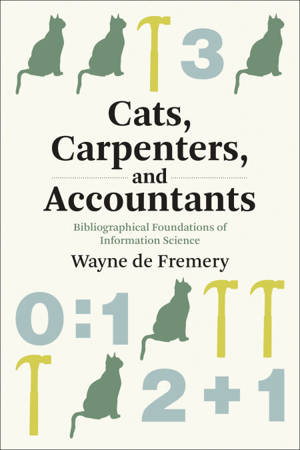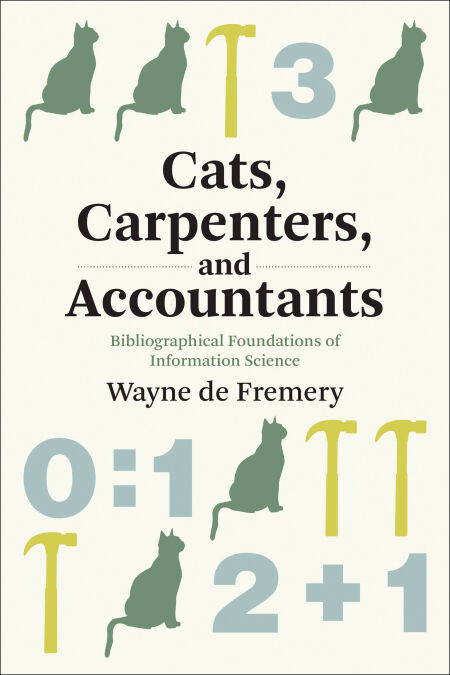
- Retrait gratuit dans votre magasin Club
- 7.000.000 titres dans notre catalogue
- Payer en toute sécurité
- Toujours un magasin près de chez vous
- Retrait gratuit dans votre magasin Club
- 7.000.0000 titres dans notre catalogue
- Payer en toute sécurité
- Toujours un magasin près de chez vous
Cats, Carpenters, and Accountants EBOOK
Bibliographical Foundations of Information Science
Wayne de Fremery
44,35 €
+ 44 points
Description
An expansive case for bibliography as infrastructure in information science.
Cats, Carpenters, and Accountants argues that bibliography serves a foundational role within information science as infrastructure, and like all infrastructures, it needs and deserves attention. Wayne de Fremery’s thoughtful provocation positions bibliography as a means to serve the many ends pursued by information scientists. He explains that bibliographic practices, such as enumeration and description, lie at the heart of knowledge practices and cultural endeavors, but these kinds of infrastructures are difficult to see. In this book, he reveals them and the ways that they formulate information and meaning, artificial intelligence, and human knowledge.
Drawing on scholarship from areas as diverse as data science, machine learning, Korean poetry, and the history of bibliography, de Fremery makes the case for understanding bibliography as a generative mode of accounting for what has been received as data, what he calls “carpentry-accounting.” Referencing a well-known debate in the Anglo-American bibliographical tradition that features a willful cat, he suggests that bibliography and bibliographers are intentionally marginal figures who, paradoxically, perform foundational work in the service of the diverse disciplinary ends that formulate, however loosely, information science as a field. When we attend to the marginal but essential work of accounting for what humankind has fashioned as recorded knowledge, it becomes easier to consider the ways that human accounts can serve and, sometimes, injure us. Relevant to scholars and students from the sciences to the humanities, Cats, Carpenters, and Accountants is a highly original argument for bibliography as a marginal but foundationally powerful force shaping information science as a field and the ways that we know.
Cats, Carpenters, and Accountants argues that bibliography serves a foundational role within information science as infrastructure, and like all infrastructures, it needs and deserves attention. Wayne de Fremery’s thoughtful provocation positions bibliography as a means to serve the many ends pursued by information scientists. He explains that bibliographic practices, such as enumeration and description, lie at the heart of knowledge practices and cultural endeavors, but these kinds of infrastructures are difficult to see. In this book, he reveals them and the ways that they formulate information and meaning, artificial intelligence, and human knowledge.
Drawing on scholarship from areas as diverse as data science, machine learning, Korean poetry, and the history of bibliography, de Fremery makes the case for understanding bibliography as a generative mode of accounting for what has been received as data, what he calls “carpentry-accounting.” Referencing a well-known debate in the Anglo-American bibliographical tradition that features a willful cat, he suggests that bibliography and bibliographers are intentionally marginal figures who, paradoxically, perform foundational work in the service of the diverse disciplinary ends that formulate, however loosely, information science as a field. When we attend to the marginal but essential work of accounting for what humankind has fashioned as recorded knowledge, it becomes easier to consider the ways that human accounts can serve and, sometimes, injure us. Relevant to scholars and students from the sciences to the humanities, Cats, Carpenters, and Accountants is a highly original argument for bibliography as a marginal but foundationally powerful force shaping information science as a field and the ways that we know.
Spécifications
Parties prenantes
- Auteur(s) :
- Editeur:
Contenu
- Nombre de pages :
- 296
- Langue:
- Anglais
- Collection :
Caractéristiques
- EAN:
- 9780262377973
- Date de parution :
- 06-05-24
- Format:
- Ebook
- Protection digitale:
- Adobe DRM
- Format numérique:
- ePub

Les avis
Nous publions uniquement les avis qui respectent les conditions requises. Consultez nos conditions pour les avis.






